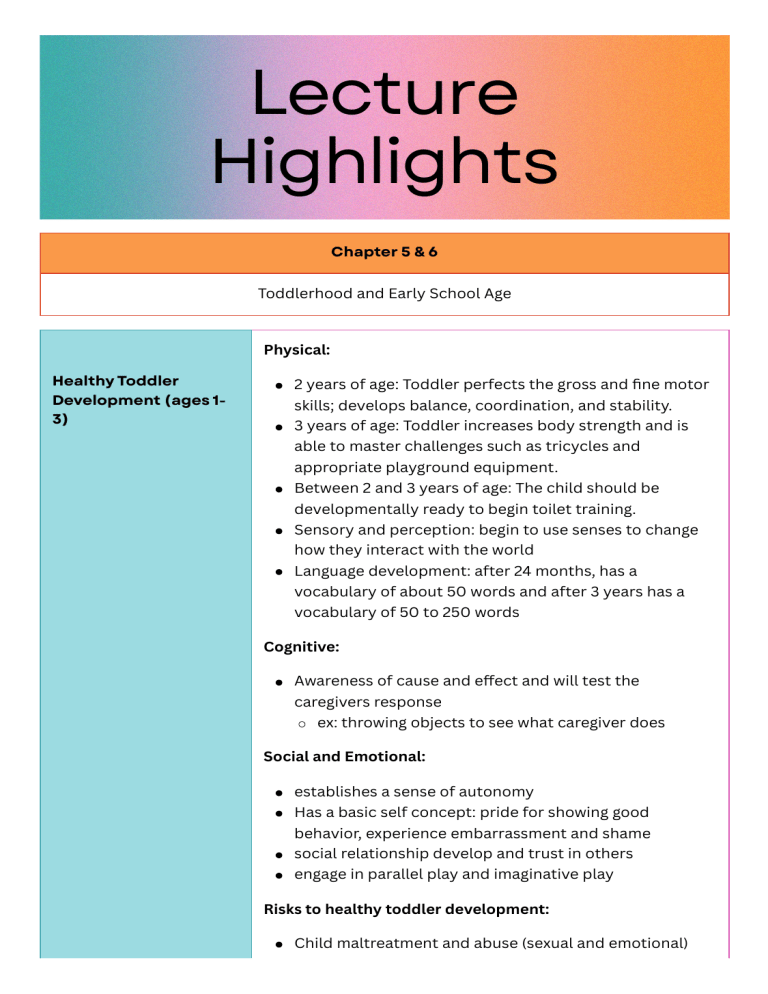
Lecture Highlights Chapter 5 & 6 Toddlerhood and Early School Age Physical: Healthy Toddler Development (ages 13) 2 years of age: Toddler perfects the gross and fine motor skills; develops balance, coordination, and stability. 3 years of age: Toddler increases body strength and is able to master challenges such as tricycles and appropriate playground equipment. Between 2 and 3 years of age: The child should be developmentally ready to begin toilet training. Sensory and perception: begin to use senses to change how they interact with the world Language development: after 24 months, has a vocabulary of about 50 words and after 3 years has a vocabulary of 50 to 250 words Cognitive: Awareness of cause and effect and will test the caregivers response ex: throwing objects to see what caregiver does Social and Emotional: establishes a sense of autonomy Has a basic self concept: pride for showing good behavior, experience embarrassment and shame social relationship develop and trust in others engage in parallel play and imaginative play Risks to healthy toddler development: Child maltreatment and abuse (sexual and emotional) Neglect (physical, emotional, medical, parental substance abuse, abandonment) Discovery of learning disabilities (early intervention programs) Counseling connection: anxiety appears around this age (often separation anxiety) Gender identity development and questioning Discussion of sexual development and abuse prevention (knowing different body parts, discussing sexual abuse) Parental education on discipline during childhood and understand temper tantrums Social skills with children Physical: Healthy Preschool/ Early School Age Development (ages 36) enhanced motor skills, climbing, jumping, and increased activity Child should get plenty of sleep and nutrition to balance activity and development Cognitive: Changes in cognition, more egocentric thinking development of symbolic thought Zone of proximal development and scaffolding until mastery are important in this stage structure and routine Moral development: understand right from wrong, has a self point of view Moral development: Kohlbergs stages of moral development Preconventional thought: Obeying the rules is important because it means avoiding punishment and Self-interest. Conventional thought: Interpersonal accord and conformity and Respect for authority and social order through obedience. Postconventional thought: Laws are regarded as social contracts where individuals can hold different opinions and Moral reasoning is based on abstract reasoning using universal ethical principles. Begin developing perspective taking skills Allow children to experience moral conflict and problem solve Social and emotional: Want to see themselves as successful and capable Changing of emotional state Develop healthy emotional behaviors is important in this stage Teach: cooperative play skills and positive relationship building Play is very important in development at this stage, play become more imaginative, social, role playing, and can foster language development and healthy social skills Risks to Healthy Development: Resilience begins to develop at this stage, foster positive resilience by teaching self regulation, problem solving skills, coping skills, and positive thinking. Along with developing healthy attachments with caregivers and friends Poor social skills: may need skills training or early intervention Counseling Connection: Identification of neurodevelopmental disorder such as autism spectrum disorder, ADHD, oppositional defiant disorder, conduct disorder Parent training programs: be consistent with parenting and consequences, do not attack or criticize child, etc. Early intervention programs Management of behavioral issues with children, behavior Tip: save this document and use it as study material for the CPCE and NCE

